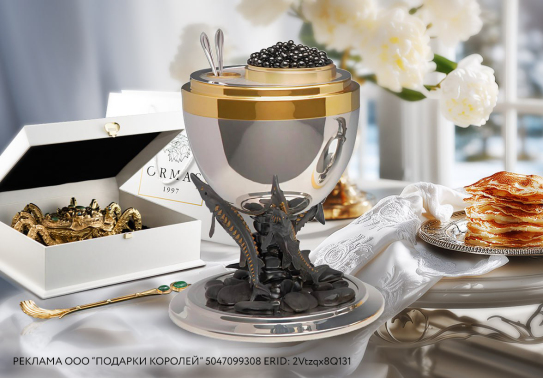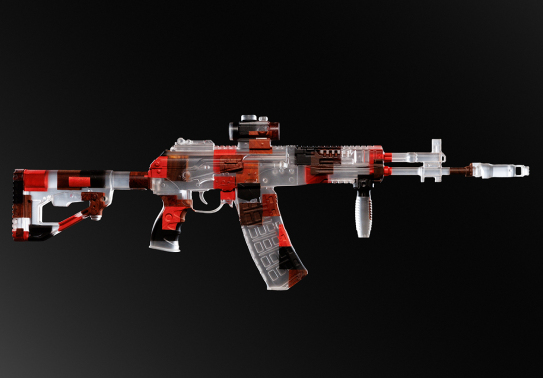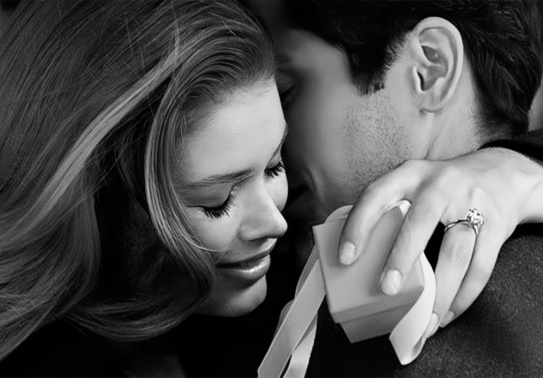Is it possible to give knives as a gift
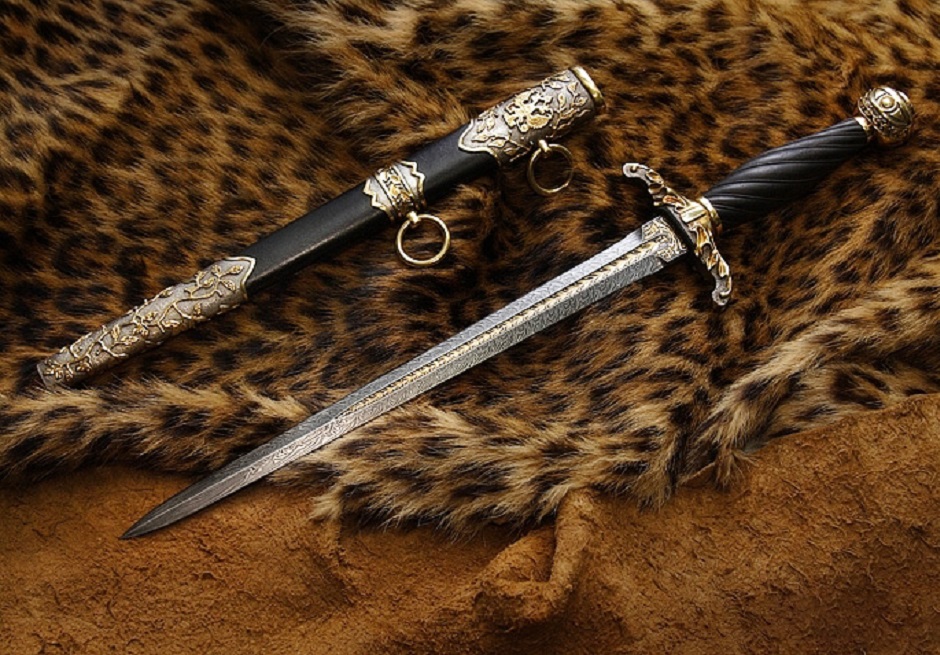
Nothing spoils the life of a Russian man like a woman's superstition. Take the same knives. After all, there is not a single one in our vast latitudes, even the most flimsy and peace-loving peasant, who would be absolutely indifferent to them.
If he were a three-time nerdy nerd, blind from being eaten by thick volumes of books. If he were four times a lazy couch beer drinker, to whom sneakers, tanks, TV have long since replaced nature, hunting, fishing and all peasant weaknesses, codenamed "away from the faithful." It is worth one of them to find himself on self-service terms in his wife's holy of holies, with a highly polished sink and ringing cupboards alone. It is worth trying to overcome a poor kitchen knife, stubbornly unwilling to separate a neat slice with a crispy crust from a still warm loaf of bread, as misunderstanding will first arise in the soul. How does she do it? And then a storm of anger will break out. Where is the touchstone in this forgotten corner? Where is the sharpened blade with a comfortable grip that pleasantly cools the palm? And he is not there, as there is no. And, most offensively, it is not necessary to expect, suddenly, a gift. Because, damn it, it's a bad omen. It remains either to defeat laziness with a sudden cavalry raid and finally move to a shiny steel purchase yourself, or…
The curtain! Let's leave the unfortunate one alone with longing, with a doomed moan bursting from his chest, which only a homeless dog in a full moon will confuse with a song, and even that with extreme hunger. Let the sufferer cheer up his own fat-coated male reflexes. And we will go to those who are less dependent on stupid fictions and are able to give a positive answer to the questions: is it possible to give knives as a gift and are knives given as a gift without fear for health, happiness, further relationships and ... There are many life catastrophes in world folklore, it remains to find out if they are so inevitable?
There is a sign, but is it about our honor?
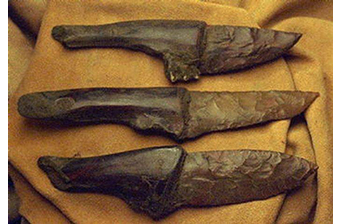
As you know, your shirt is closer to your body, therefore, in the first lines we will talk exclusively about compatriots, that is, about a Russian peasant with all his national character features that have not been formed today.
You can't call a knife a native Russian invention in any way, our cave ancestors invented it, because this item does not have a strict territorial registration. The first written memories of the knife in Russia date back to the IX - XII centuries, that is, they are sometimes mentioned in passing in the oldest extant chronicle. And since the chronicles were compiled not somewhere, but in Orthodox monasteries, from where writing and scholarship in general came, knives were not endowed with any magical properties in them and could not be endowed.
As for the Russian people in the pre-Christian period. He was undoubtedly familiar with the sharp metal friend. Moreover, as follows from the folk legends passed from mouth to mouth, men, women and children were equally familiar with him. The knife was considered an attribute of a free man, it hung on the belt of everyone and everyone who grew out of infant shrouds and learned to walk on their own. The time, tea, did not spoil the tranquility, and even with other devices for a comfortable life it was still not thick. And since pagan beliefs endowed everything and everyone with magic, the knife also got irrationally otherworldly properties.
The pagan Slavs believed that their knife should not be given into the wrong hands, because it is able to transfer the power of the owner to a stranger. For the same reason, they were afraid to lose the knife. They believed that a knife could protect against enemy sorcery. They swore the most terrible oaths on the knife. Through the knife, engagements were carried out, if you can call it that, the ceremony in which the groom gave the knife to the bride, and if she accepted it, then she agreed to live together. A pregnant woman hid a knife under the couch on which she slept so that the child would be born strong and healthy. The knife was placed in the cradle of the baby, as a talisman against sudden death and evil forces. The knife was stuck in the windowsill or in the jamb above the door to protect the house from the invasion of robbers, robbers and all the dashing people. And finally, the knife was literally taken with them to the grave, as evidenced by archaeological finds during the excavations of ancient Slavic graves.
There is no native Russian explanation for the fact that a knife cannot be given. Moreover, there is written evidence that in a later period, when Russia gradually became a centralized state, the knife, like any cold steel, began to be considered a particularly valuable gift, which the princes, and later the tsars tried to present to particularly distinguished warriors and all those who deserved the highest honors and respect.
And by the way, echoes of this tradition have reached our days, despite all the signs that came from nowhere. It is enough to recall the gift dirk, awarded on the day of the assignment of an officer's rank, or the gift knife, which Siberians and Caucasians necessarily give to happy fathers on the occasion of the birth of their son.
Who slandered the blade?

So why is the bad name of a "bad gift" attached to a knife in our time? There is no consensus on this issue. It is also not possible to name the exact day and hour when this injustice occurred. But we can safely assume that it was imported into the territory of the Russian state by foreigners, those whose national traditions were strikingly different from our own. And there were and still are plenty of them even in our immediate neighborhood.
You can not give knives, like any cold steel, in China and some Arab countries. Here it is feared that the gift blade will instantly cut off friendly ties. The presented knife is regarded as a desire for a quarrel, an audacious challenge and an obsessive provocation.
In Mongolia, from the time of Genghis Khan to this day, the prohibition to cross the threshold of a yurt with at least some sharp object is sacredly respected. Even the guest must remove his own knife from its sheath and leave it in front of the entrance to the dwelling, otherwise, his peaceful intentions will cause doubts. Giving a knife is akin to an open declaration of war.
Pedantic Germans and prim Englishmen refrain from giving a knife. The remnants of the dark Middle Ages that have settled in their minds are chilling with an uneasy premonition, they say, the presented sharp object will surely someday end up in the body of the one to whom it was accidentally thrust. You can understand their fears, in the days of patchwork European states, when neighbor to neighbor came only to chop off part of the land ownership, and it is better to kill the owner so that he did not have to split up his already tight fief. With such good-neighborly relations, nothing good could be expected from a knife in the hands of a guest. Therefore, even now, if the knife presented to the owner was the most expensive and beautiful, its donor would be suspected of anything but kindness of heart and warm friendly feelings.
A knife as a gift is good!
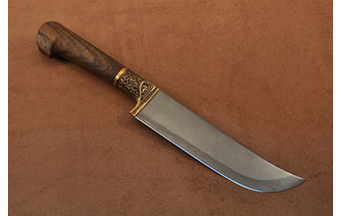
There are also enough nations and peoples who do not doubt this at all. For a resident of Central Asia, there is no better, more expensive and more prestigious gift than a knife. A sharpened blade is considered to be the most powerful amulet against all adversity and misfortune. The knife is given to the closest and dearest people to protect, protect, show their love and affection.
Happy gift knives, by the way, often have the most peaceful character. In Uzbekistan, for example, the pchak knife (aka pichok or pechak) is a symbol of male honor. Household tools are versatile: even cut a melon, even bread. And the deliberate luxury of decoration, which is used to judge the wealth and status of the owner.
A bee given to the father of a newborn baby is a concern for the health of the crumbs, the knife should be put under the baby's pillow, and it will protect his sleep. A bee, presented to a young man, informs about the recognition of his coming of age and acceptance into the adult male world. The bee, presented by the son to the father, speaks of immeasurable love and gratitude.
A welcome gift is a knife for a Japanese, here he is also tasked with restraining the onslaught of all possible troubles. Moreover, he is also able to cut through, cut through, clear the way to success and open a new happy page in an unfortunate fate.
It is especially important to receive such a birthday gift upon reaching the unhappy age of yakudosi. The 19th, 33rd and 37th years of life are considered unhappy for Japanese women, and the 25th, 42nd and 61st for men. Moreover, the age is counted not from the moment of birth, but from the day of conception, that is, plus nine months to the record made in the maternity hospital.
You can give, but still carefully
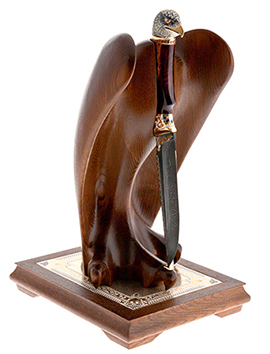
If you look at the far-fetched problem of bad gift symbols of a knife from the position of male sanity, there is no problem at all. No normal man would refuse a good knife, even a simple one. And if it is a blade made of Damascus steel or a patterned and gilded handsome one from the gunsmiths of the Ural Zlatoust? Yes, who would even think about some obscure signs in this happiest moment of life?!
But, if suddenly, there was a chagrin to run into some overly sensitive individual with a sharp gift and see genuine superstitious horror in his eyes? There is nothing to do, you will have to neutralize the unwanted reaction. Even if you yourself, as an enlightened, Orthodox, reasonable person (it is necessary to emphasize) do not believe in omens, it does not hurt to take care of the peace of your neighbor. After all, you were planning to please him, not upset him.
A great way to outwit superstition and get the desired gift without fear was invented by the same cautious inhabitants of medieval Europe. The British gave half a penny for the knife presented to them, and the gift ceased to be a gift, passing into the category of profitable acquisitions. It is not only possible to buy knives, but also necessary, no one doubts that for sure. And if so, it is unnecessary to fear the crushing consequences of the accepted gift.
The polite Japanese went even further in the diplomatic tricks of gift etiquette. Handing the knife to a stranger, in case he did not share their optimism about the cutting gift, they attached a small coin to it, which the recipient of the gift, in case of doubt, could pay them immediately, without frantically feeling his own pockets.
Give me knives, give me knives!
Hunting and hiking, sabers and swords, daggers and dirks. For all holidays, personal, family, industrial and just made up by you. The Russian knight, brought up in respect for freedom, weapons and ancestors, will be incredibly pleased. As for men of other lands and estates, they say they do not go to a foreign monastery with their own rules. It is necessary and important to respect the opinion of people of a different faith and morals, but it is not necessary to follow the traditions of others.


